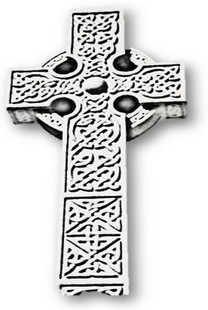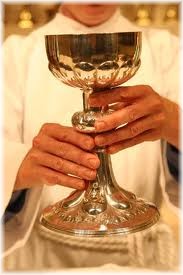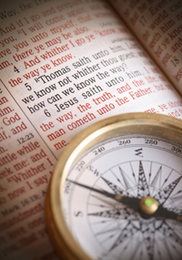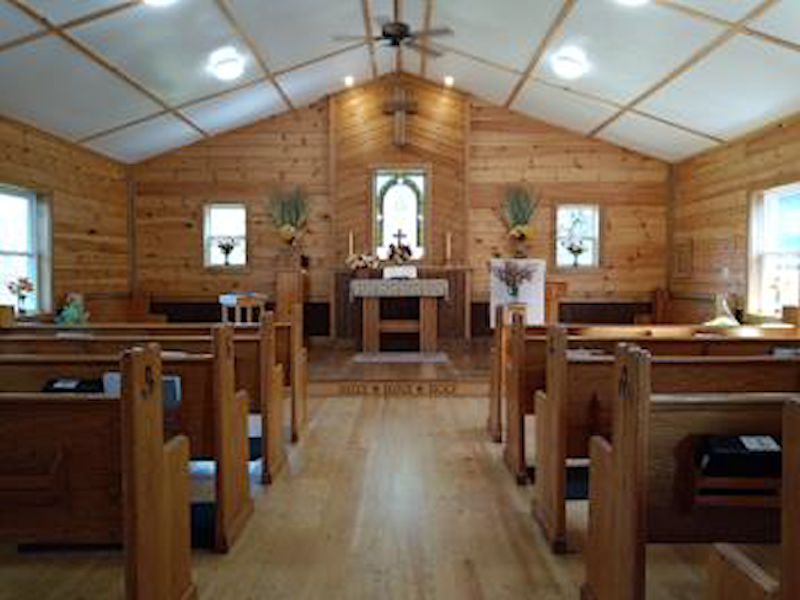
Thank you for your interest in Holy Trinity Chapel at Saint Brendan’s. Whatever your church background, you are sure to find some things in our worship service that are very familiar and some things that are a bit different. Here's a brief explanation of who and what we are.
While we love music and prayer and preaching, the central focus of our worship is the Celebration of the Eucharist at the altar (perhaps the terms you're familiar with are Communion, the Lord's Supper, or the Mass). When we celebrate the Eucharist, it looks very much like what you might find in other Anglo-Catholic traditions. But that doesn't mean we're "high church" or "smells and bells"--far from it! Other words that describe our worship services include: traditional, conservative, evangelical, sacramental, liturgical, and charismatic (or Spirit-filled). Some people call this "convergence" or "blended" worship How does blended worship work? Keep reading!
While we love music and prayer and preaching, the central focus of our worship is the Celebration of the Eucharist at the altar (perhaps the terms you're familiar with are Communion, the Lord's Supper, or the Mass). When we celebrate the Eucharist, it looks very much like what you might find in other Anglo-Catholic traditions. But that doesn't mean we're "high church" or "smells and bells"--far from it! Other words that describe our worship services include: traditional, conservative, evangelical, sacramental, liturgical, and charismatic (or Spirit-filled). Some people call this "convergence" or "blended" worship How does blended worship work? Keep reading!

HISTORICAL/SACRAMENTAL
From the first days of Christian worship, the faithful have always understood that they were a part of something profoundly special: the "One, Holy, Catholic, and Apostolic Church." The word ‘catholic’ in this sense doesn't mean Roman Catholic; rather it means that which is “in accordance with the universal, undivided Church from the beginning”. Many congregations are rediscovering the authentic beauty of this rich heritage by incorporating ancient patterns of liturgical worship into their own weekly services. They are also reclaiming the early signs and symbols of faith as well as the regular (weekly) observance of Holy Eucharist. While some contemporary believers may view the use of liturgy as a dead form of worship, the real question isn’t whether the liturgy is dead or alive but if it's true or false. You see, only people can be dead or alive. That means when spiritual alive people worship God in true forms of worship according to Scripture and Apostolic Tradition, exciting things happen! Our liturgical order of worship is drawn from the best of the 1662, 1928, 1979, and 2019 editions of the Book of Common Prayer.
From the first days of Christian worship, the faithful have always understood that they were a part of something profoundly special: the "One, Holy, Catholic, and Apostolic Church." The word ‘catholic’ in this sense doesn't mean Roman Catholic; rather it means that which is “in accordance with the universal, undivided Church from the beginning”. Many congregations are rediscovering the authentic beauty of this rich heritage by incorporating ancient patterns of liturgical worship into their own weekly services. They are also reclaiming the early signs and symbols of faith as well as the regular (weekly) observance of Holy Eucharist. While some contemporary believers may view the use of liturgy as a dead form of worship, the real question isn’t whether the liturgy is dead or alive but if it's true or false. You see, only people can be dead or alive. That means when spiritual alive people worship God in true forms of worship according to Scripture and Apostolic Tradition, exciting things happen! Our liturgical order of worship is drawn from the best of the 1662, 1928, 1979, and 2019 editions of the Book of Common Prayer.

EVANGELICAL
As part of the ancient faith of the Church, we confess the Holy Scriptures to be the inspired, infallible, and authoritative Word of God, containing all things necessary to salvation and godly living. We are committed to faithfully reading, studying, teaching, proclaiming, and living in obedience to the Scriptures. We also embrace the Evangelical message of a personal relationship with Jesus Christ lived out in holy life, discipleship, evangelism, and missions.
As part of the ancient faith of the Church, we confess the Holy Scriptures to be the inspired, infallible, and authoritative Word of God, containing all things necessary to salvation and godly living. We are committed to faithfully reading, studying, teaching, proclaiming, and living in obedience to the Scriptures. We also embrace the Evangelical message of a personal relationship with Jesus Christ lived out in holy life, discipleship, evangelism, and missions.

CHARISMATIC
A distinguishing mark of Holy Trinity Chapel is our openness to the work of the Holy Spirit. God’s people have always been a spiritually gifted people. From the time of the Apostles on the Day of Pentecost to the Spirit-filled believers of today, Christians have been directly imparted with charisms (gifts) from the Holy Spirit Himself. That's why we not only allow, but anticipate the move of the Holy Spirit through His presence and power in the biblical operation of His spiritual gifts, both in our worship and through our daily acts of service.
A distinguishing mark of Holy Trinity Chapel is our openness to the work of the Holy Spirit. God’s people have always been a spiritually gifted people. From the time of the Apostles on the Day of Pentecost to the Spirit-filled believers of today, Christians have been directly imparted with charisms (gifts) from the Holy Spirit Himself. That's why we not only allow, but anticipate the move of the Holy Spirit through His presence and power in the biblical operation of His spiritual gifts, both in our worship and through our daily acts of service.

A DIFFERENT KIND OF FAITH COMMUNITY
In addition to our blended worship, Holy Trinity Chapel is fervently committed to the spiritual formation and discipleship of its members. This is an outflow of our monastic work at Saint Brendan’s. What does this look like? As German theologian Dietrich Bonheoffer once wrote, “When Jesus calls a man, He bids him come and die.” This kind of message—this call to be a living sacrifice (Romans 12:1-2)—stands in such contrast to America’s contemporary Christian message that it sounds like a foreign concept. We want to grow in this kind of intentional discipleship by inviting everyone who attends the Eucharist to stay after the service for fellowship and study. These studies are either an in-depth examination of the Scripture readings from the service, a verse-by-verse study of a book from the Bible, or a topical discussion of key Christian doctrines. But mostly this is a time to help us grow in a living, loving relationship with Jesus Christ and one another.
Currently, the Eucharist is celebrated in Holy Trinity Chapel on Sundays at 9:30 AM and Thursdays at 11:30 AM.
In addition to our blended worship, Holy Trinity Chapel is fervently committed to the spiritual formation and discipleship of its members. This is an outflow of our monastic work at Saint Brendan’s. What does this look like? As German theologian Dietrich Bonheoffer once wrote, “When Jesus calls a man, He bids him come and die.” This kind of message—this call to be a living sacrifice (Romans 12:1-2)—stands in such contrast to America’s contemporary Christian message that it sounds like a foreign concept. We want to grow in this kind of intentional discipleship by inviting everyone who attends the Eucharist to stay after the service for fellowship and study. These studies are either an in-depth examination of the Scripture readings from the service, a verse-by-verse study of a book from the Bible, or a topical discussion of key Christian doctrines. But mostly this is a time to help us grow in a living, loving relationship with Jesus Christ and one another.
Currently, the Eucharist is celebrated in Holy Trinity Chapel on Sundays at 9:30 AM and Thursdays at 11:30 AM.
HYMN FOR TODAY
Tis the gift to be simple, ‘tis the gift to be free
'Tis the gift to come down where we ought to be,
And when we find ourselves in the place just right,
'Twill be in the valley of love and delight.
“Tis the Gift to Be Simple” -- Text, Joseph Brackett (1797-1882); Shaker dancing song
Tis the gift to be simple, ‘tis the gift to be free
'Tis the gift to come down where we ought to be,
And when we find ourselves in the place just right,
'Twill be in the valley of love and delight.
“Tis the Gift to Be Simple” -- Text, Joseph Brackett (1797-1882); Shaker dancing song

